A good leader knows when to take on responsibility and when to delegate it. Without this crucial mode of authority shifting, you risk falling behind on tasks, accumulating extra costs, and not letting your employees learn and grow.
Therefore, if you want to be a good leader, you have to understand the art of delegation. This article will explain why so much importance is placed on delegation and how to go about it the right way.
If you’re interested in becoming a knowledgeable delegator, let’s dive right into it!
In this article...
Accept That Delegation Helps Your Construction Business Grow
From time to time, you have to let someone else take the reins, no matter how difficult that sounds.
Delegation means handing tasks over to other people instead of trying to do everything yourself.
Some managers may have a hard time letting employees take over jobs, no matter how minuscule, out of fear that quality will suffer or that the worker will do a better job than them.
A natural leader knows how to share work with others without being intimidated by them, which is why delegation is key.
Here’s how delegation can benefit your construction company.
Firstly, look at delegating as doing yourself a favor.
If you let others handle simpler or less challenging tasks, you have time to tackle ones that require your immediate attention or ones only you can take.
That way, you’re getting the minor stuff out of the way and focusing on bigger project steps that could potentially set the project back and cost a lot of money.
You can also think of it as something that benefits your employees. Knowing the project manager trusts them with handling a vital task will give them a sense of accomplishment and responsibility.
Moreover, if you delegate the tasks to a third-party contractor, you’re easing the burden off your construction team and yourself while still getting the job done, and this is important.
Studies show that 75% of employees have experienced burnout, and an additional 36% think their company isn’t doing much to help.
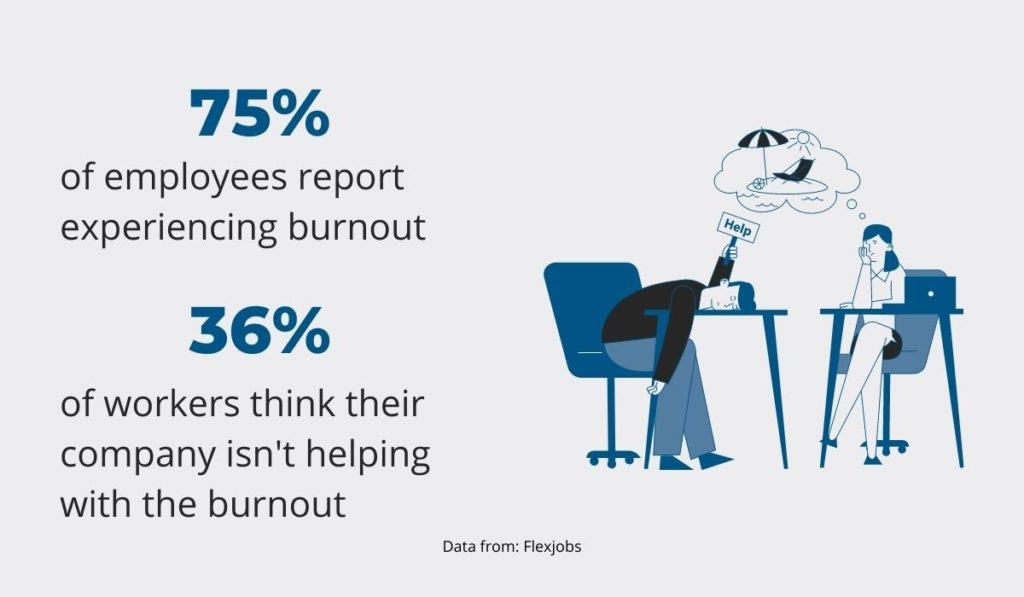
Therefore, a dire need for reducing workload is evident. By delegating to a professional, you successfully manage to get the job done without giving too much work to yourself or your employees, thus reducing their chances of burnout at work.
Determine Which Tasks You Can Delegate
The key to being a good delegator is knowing which tasks to transfer to another person.
It might seem easy to make this decision. After all, you just have to ask someone to do whatever you don’t have time or the capacity to do, right? Well, that might not be the case.
For example, you might be facing expensive setbacks, which means you’ll have to recalculate project costs and determine ways to save money and not go overboard with additional expenses.
At the same time, you might need to work on the following week’s schedule for your field workers.
In that case, you’d probably take over the first task as it’s an important one that affects the entire project and can’t be easily transferred to someone else. However, you could delegate the second task to one of the shift managers or a field supervisor.
What is the factor that helps you determine whether to delegate something?
According to Richard Steven, the president of Fulcra Consulting, it’s how easily you can define the task.
In an interview for Remodeling, Steven explained you should transfer the tasks that you can easily define.
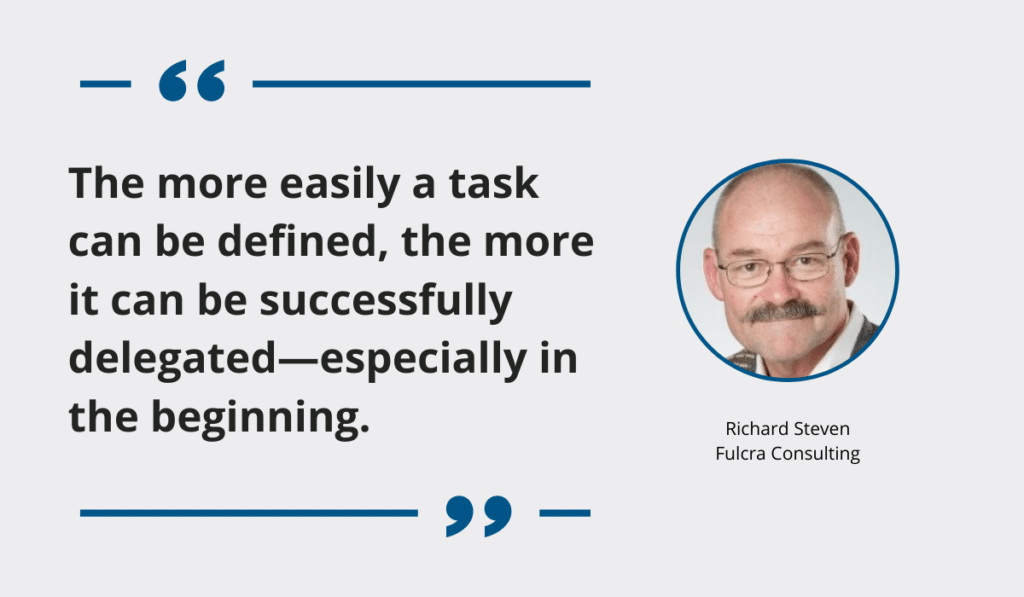
If we return to the two examples from earlier, it’s clear which one you could explain in a step or two and which one would take a long time to define and describe.
Therefore, when you’re dealing with different tasks and aren’t sure which one to transfer to your team members, ask yourself how easily you can explain the job at hand.
Here are some questions that can help you figure it out:
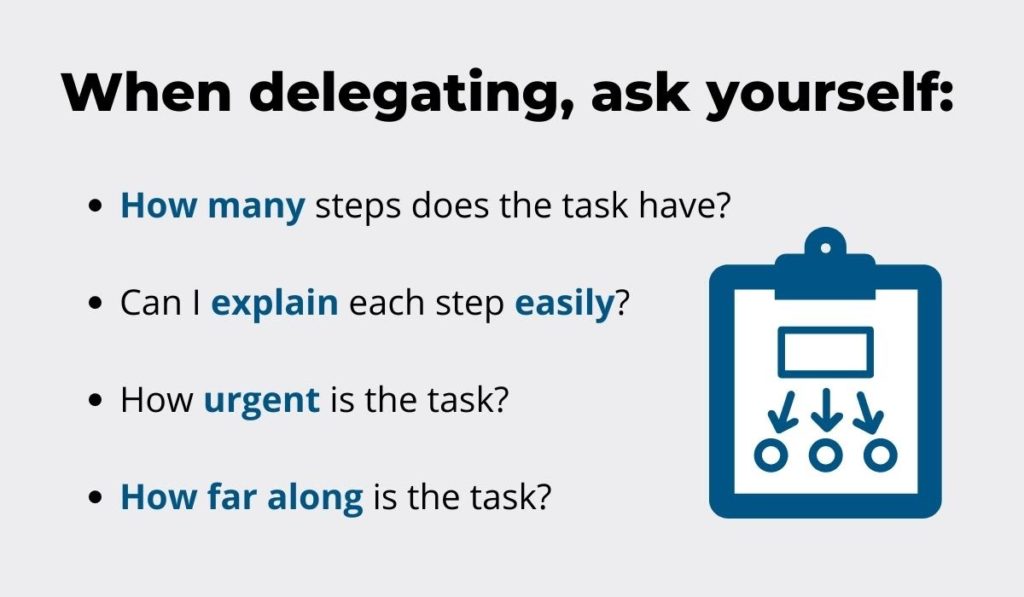
Each of these questions can lead you to decide whether to transfer the assignment at hand to one of your team members. If something is urgent and would take a while for you to explain and the worker to achieve it, it’s better not to delegate it.
The same goes for a task that’s already underway. Asking someone to finish what you’ve started can confuse the person, especially if you use different methods to achieve the same goals.
In the end, the worker might need more time to pick up where you left off than handle a new task from the beginning.
Make Your Construction Team Feel More Confident
Delegating is all about making employees feel more confident about their skills and knowledge.
Because of this, you should try to do it as much as possible. The more you delegate, the more empowered your team will feel, which instantly brings in better results.
On the other hand, if you don’t trust your workers and show them you value their work, they will lose interest in their job and eventually leave.
A whopping 79% of employees who quit their jobs reported a lack of appreciation as a key reason for leaving, so that should be incentive enough.
When employees feel underappreciated, they are no longer motivated to be top performers or get as much done as possible. Why would they if no one notices the work they do?
Therefore, recognition also plays a key role in empowering your workers. They say so themselves: a study shows that workers consider recognition the most important way their company can support them.

Contrary to popular belief, employees seem to value recognition more than money or a promotion, so it’s time to invest more in supporting your employees and empowering them that way.
There are many ways of investing in your employees and helping them finish tasks independently, but training and tools are the two most important.
If you want your employees to take on tasks or delegate them to others, you have to offer sufficient training and teach them how to do it successfully.
Otherwise, you’re asking people to do something they do not know how to do, which can demotivate them.
To be precise, research has found that many companies do exactly that: 46% of companies were concerned about their employees’ delegation skills. At the same time, only 28% of those companies offered any training on the topic.
The point is, if you want your workers to be good at something, you have to invest in their training.
However, training is often not enough. In an interview for Remodeling, Fortitude Consulting’s John Boggs advises business owners to also offer the necessary resources to get the job done.
“It’s not always money—sometimes it’s people and equipment,” Boggs says, stressing the importance of having the right tools at the workplace.
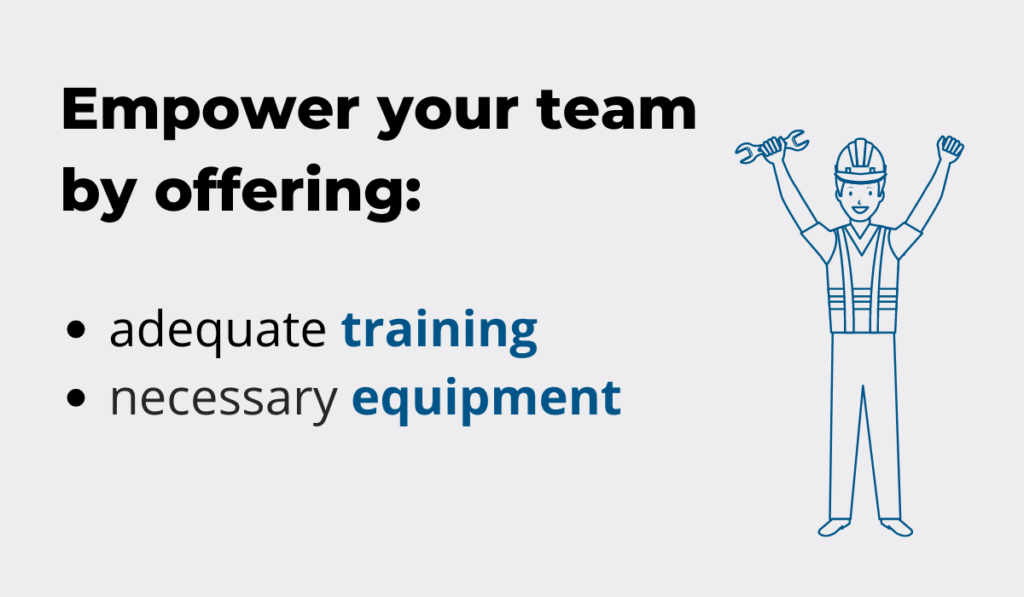
This statement is especially true in the construction industry, where the quality and availability of tools and equipment can affect the entire project, including its cost and deadline.
If you want your workers to handle tasks independently, empower them by offering them enough equipment.
For example, tool tracking is a great way to keep track of all your tools and let your team check precisely what they can use and when.
Software like GoCodes allows your team to find a tool in the database and see whether it’s checked out, all without having to leave their workplace or contact the manager.
Therefore, the process empowers the worker and allows them to locate and check out the tool on their own.
Choose the Right Team Member for the Task
It’s easy to delegate if you know your employees’ strengths and weaknesses.
If you don’t, you’ll be setting yourself and the employee up for failure because you’ll probably be giving out tasks that don’t match the worker’s knowledge or skill set.
Such tasks will additionally burden the worker, take more time to finish, and their quality won’t be as high as expected.
The point of delegation is to allow someone else to finish a task. However, if the person you choose doesn’t know or can’t do that, your delegation is pointless and will cause even more problems for you.
You will not only have to do the task yourself or ask someone else for help, but the incident will negatively impact the person who failed at accomplishing the task.
Entrepreneur research by Gallup showed that people who knew how to delegate achieved better results on a company scale than those who didn’t.
Such companies had a 122% higher growth rate and generated 33% more revenue, which again shows that delegation can benefit you greatly if you learn how to do it properly.
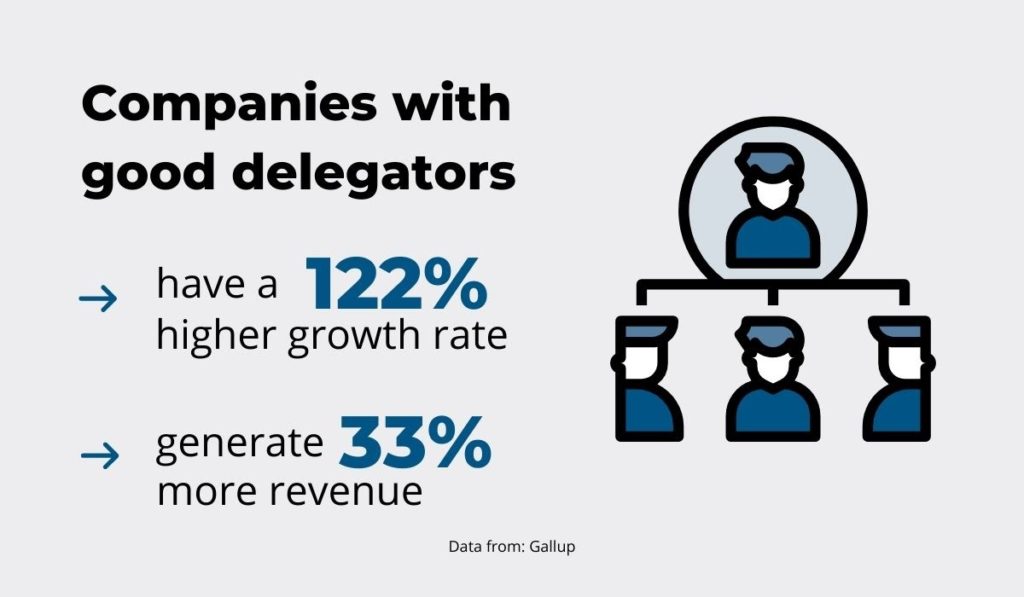
Gallup explains that the managers with a talent for delegation chose to delegate based on skill sets rather than availability.
In other words, they chose the person who was qualified to take on a task instead of choosing someone that was free at the time or someone who could do it quickly.
According to the research, this type of delegation is the way to go as it plays on your team’s strengths and motivates them while ensuring that the job gets done correctly.
Because such managers gave the tasks to people who were the best fit for the job, they achieved excellent results. The employees felt more motivated and empowered to do the job since they did something perfectly suited to their skillset.
The next time you run into a task that you can delegate, try to think of the right person for the job instead of looking for someone who happens to be available or volunteers for the role.
Follow Up Without Micromanaging
Micromanagement can spell doom for your company morale, so steer clear of it when following up on delegated work.
We all have the urge to double-check and see if we or someone else has missed a point or two, but we’re not always aware of the effect it has on the micromanaged.
A study confirmed what everyone already knew: people don’t appreciate this type of management.
More precisely, 85% of people reported micromanagement harmed their morale, while 36% quit their job because of it. Micromanaging your employees will also interfere with their performance, as confirmed by 71% of survey respondents.
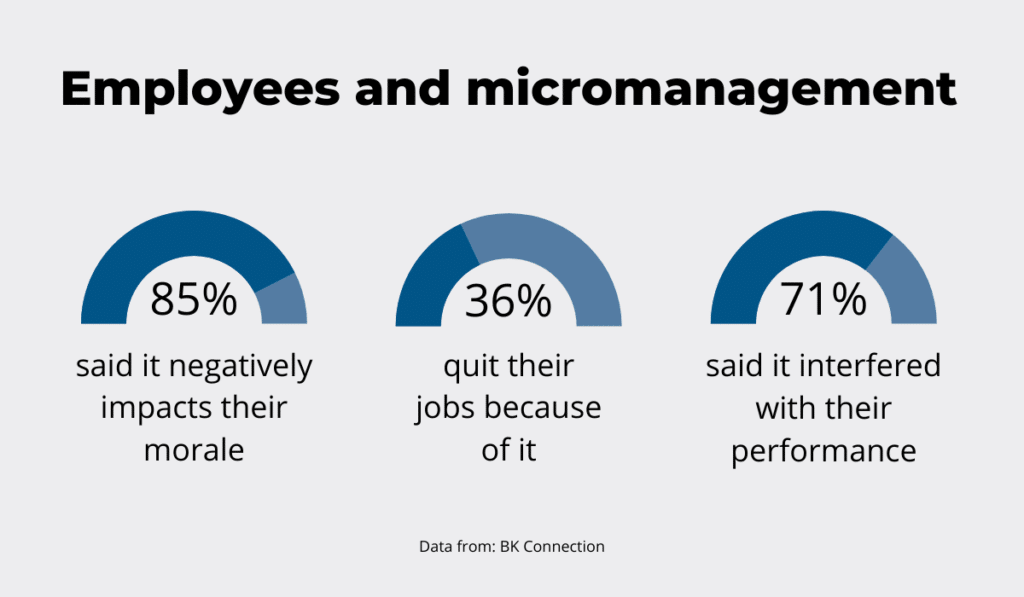
Clearly, micromanaging is not the way to go if you want a happy and productive team.
Is the solution to delegate, leave your team to it, and hope for the best? Absolutely not. Such an attitude won’t give you any results either since you won’t provide feedback to your team and help them improve.
You need to find ways to follow up on the delegated work without seeming like you are micromanaging the person. Jeffrey Pfeffer, Professor of Organizational Behavior, thinks delegation should give people ample opportunity to learn and improve.

A good way of keeping up with the delegated work without micromanaging is agreeing on daily email progress updates or weekly one-on-one meetings, depending on the importance and urgency of the said task.
Such check-ins will allow you to stay in the loop and understand the progress without making the employee feel like they have to report their every more.
During such check-ins, you can ask the worker to report points that caused them issues since this gives you the perfect opportunity to help them figure out how to solve the problem.
Pfeffer also warns about being too lax and not keeping up with the task. Instead, you should strive for the perfect balance and stay in the know on significant points and overall progress while not managing every job detail.
Conclusion
The act of delegating comes after carefully deciding which task you should even give your employees and which workers are best qualified to do it well, based on their skillset.
Because of all of this, delegating isn’t as easy as just assigning responsibility to someone else.
However, if you consider your workers’ skills and knowledge and the importance and urgency of the task, you’ll be able to make more informed decisions.
When you also fight the urge to micromanage while catching up with the task’s progress, you’ll ace the delegation process and reap all its benefits.





